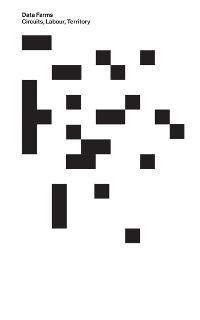Data Farms, edited by Tsvetelina Hristova, Brett Neilson and Ned Rossiter
 Monday, January 30, 2023 at 9:25AM
Monday, January 30, 2023 at 9:25AM Open Humanities Press is pleased to announce the publication of Data Farms, edited by Tsvetelina Hristova, Brett Neilson and Ned Rossiter.
Like all Open Humanities Press books, Data Farms is available open access (it can be downloaded for free):
http://www.openhumanitiespress.org/books/titles/data-farms/

Book description:
What is at stake in naming data centres as data farms? These installations are essentially hangars packed with computers. They congregate servers, switches and wires that facilitate the storage, processing and transmission of data in high volumes and at fast speeds. Data centres present a scale of operations, potentially planetary in scope, that intensifies and multiplies the productive and extractive capacities of digital technologies. The economic advantages that accrue to parties with servers in these installations derive not only from opportunities for peering and networking but also from inputs to client machines that may be situated at vast distance. Yet data centres have precise locations, often clustering where there is access to energy, skills, land concessions, tax exemptions or undersea cables. There are no data centres without land and water. Like the ‘dark satanic mills’ associated with the factories of the industrial revolution, data centres burn fossil fuels. Yet, despite these continuities with agrarian and industrial activity, the data economy generates stark figurations of territory, power and circulation.
Contents
LAND AND WATER, Brett Neilson & Ned Rossiter
HABITS, DATA, LABOUR: FROM WAREHOUSES TO DATA CENTRES, Liam Magee & Ned Rossiter
TOWARDS A FEMINIST SERVER STACK, Nancy Mauro-Flude
CLOUD COSMOGRAM, Maya Indira Ganesh & Johannes Bruder
THE INTERNET BEYOND BORDERLESS VERSUS FRAGMENTED, Luke Munn
ISLAND IN THE NET, Stefan Yong
HOW DATA CENTRES PRODUCE TOPOLOGIES OF TERRITORY AND LABOUR, Brett Neilson & Tanya Notley
DATA FARMS SONIFCATION: AN EXPERIMENT IN DATA MODELLING AND SPATIAL AUDIO, Sarah Cashman, Michela Ledwidge & Brett Neilson
DATA CENTRES: IN THE MIDDLE OF NOWHERE AND EVERYWHERE, Rolien Hoyng
CAPITAL OPERATIONS: DATA AND WASTE, Brett Neilson
THE DISPOSITIF OF DISTRIBUTION AND THE GEOPOLITICS OF DATA, Florian Sprenge
Editor Bios
Tsvetelina Hristova is Postdoctoral Research Fellow at the Institute for Culture and Society, Western Sydney University.
Brett Neilson is Professor at the Institute for Culture and Society, Western Sydney University. He is author, with Sandro Mezzadra, of Border as Method, or, the Multiplication of Labor and The Politics of Operations: Excavating Contemporary Capitalism.
Ned Rossiter is Director of Research at the Institute for Culture and Society, and Professor of Communication, School of Humanities and Communication Arts, Western Sydney University. His current book projects include Media of Decision and (with Soenke Zehle) The Experience of Digital Objects: Automation, Aesthetics, Algorithms.
Series
Data Farms is published as part of the Low Latencies series, edited by Brett Neilson and Ned Rossiter:
http://www.openhumanitiespress.org/books/series/low-latencies/
 Gary Hall | Comments Off |
Gary Hall | Comments Off | 




